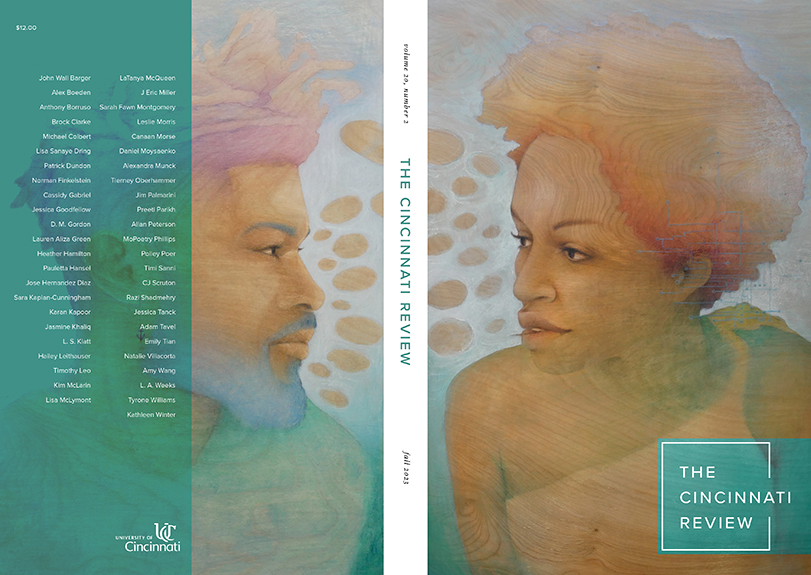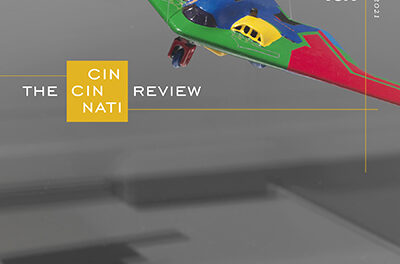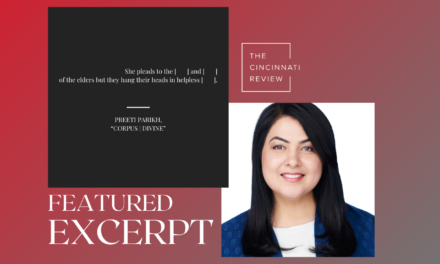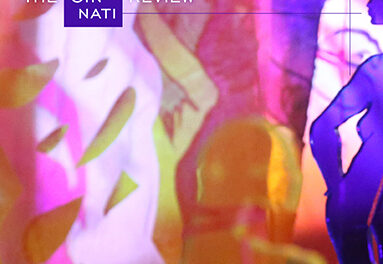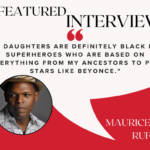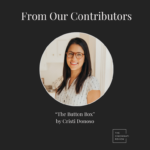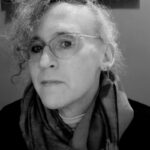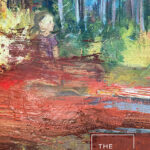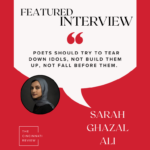“The peephole is installed backward,” my one-night stand said as I sat up in bed. We were in his high-rise studio apartment. “I keep meaning to tape a piece of paper over it.”
I thought about what this meant. A tiny aperture gave passersby in the hallway a fish-eye view into the bedroom. It wasn’t exactly the attention I wanted. I glared at the door. “Who installed it?”
“Always been that way,” he called from the bathroom. When he emerged through the steam, his hair was combed, and he looked exactly as he had the night before, minus a gun. The gun had been his most appealing feature, though. Its simultaneous danger and safety had kept my mind far from more devastating facts.
He stirred cream and sugar into a mug of coffee and brought it to me. I took a sip, and he said, “What’s your background?”
I played dumb. “My background?”
“You’re very beautiful,” he said. “Where are you from?”
“Thank you,” I said. “I’m from here. Florida. Like you.”
He chuckled. “No.” He started to say more, but staticky voices came through his radio. He frowned. “I have to go,” he said. I didn’t like him, but I didn’t want him to go. He slung his belt holster over one shoulder and picked up keys from a junk tray on the entry table, which was in the bedroom. It was all one room. “Stay as long as you like,” he said. Deadpan, I blew him a kiss. His shiny badge caught an edge of sunlight as he turned to leave.
He pulled the door shut behind him. His keys rattled on the other side, and I watched the dead bolt turn. I wondered if he had ever used excessive force. Then I opened all the windows and smoked a cigarette, naked in the breeze. I was going to see my mother later that day and didn’t want her sniffing me and commenting on my nicotine habit. Obviously smoking is bad for you, but I needed something to do.
After I finished, I got dressed. My day would only get worse. But first, I headed over the Sunshine Skyway Bridge. The bridge and I were introduced to the world on the same day, April 20, 1987. April 20 was also Hitler’s birthday and the day Deepwater Horizon exploded in the Gulf of Mexico, but we get to pick where to find meaning in our lives, and I loved the Skyway Bridge. Its deck hung from cables attached to two towers along the median. Over either edge you could see unobstructed views of Tampa Bay, like an expanse of hammered cobalt, from hundreds of feet up. On foggy days, the bridge’s roadway looked like it crested in the clouds. I wanted to drive over it indefinitely. On the other side, I had funerals to attend.
The forecast called for thunderstorms, and strong winds made my little red car drift. Near the apex, construction slowed traffic to a stop. Brake lights dotted the path ahead. I was going to be late, though who would notice? As I contemplated a series of bright red cubes evenly spaced along the road’s shoulder, the magic of the bridge faded. A sign above each red cube said “Crisis Center.” Cars honked, and I rolled up my windows to keep out the noise. These Crisis Centers were free phone booths that connected callers to the suicide-prevention hotline. I had called the hotline once, out of curiosity. On the other end of the line, they hadn’t been good at their job.
People were always jumping off the Skyway Bridge. They crossed state lines to do it. Over the years, despite the Crisis Centers and around-the-clock patrols, Tampa Bay had become a hot spot. Now Tampa was installing a suicide prevention net. For sixty-five days, protesters had chanted things like “More Net, Less Death!” on the bridge’s mainland side, until the City Council approved the project and construction began. The net would be a mile and a half of steel obstacle. I couldn’t help but think that if a person wanted to kill themself, they would find a way. The barrier was only going to ruin the view. I loved the black path disappearing into a bright white abyss.
* * *
I’d spent the previous evening on the downtown pier, not far from the bridge. At first, I’d picked through the stores along the main strip, brushing my fingertips across trinkets, ceramic tableware, and the cellophane wrapping of fine chocolate. I admired a glazed earthenware jar with a blue-and-green maritime design. The price tag said $340. What if I picked up the jar—a perfect vessel to hold a loved one’s ashes—held it out in front of me, and let go? Its crash and the shards at my feet might help release the charge in my chest.
I wandered along the pier, where an overweight man performed cover songs with an acoustic guitar and headset microphone. Children ran around in wet bathing suits, their lips purple and chattering, and red-faced adults shouted at referees on the outdoor bar’s wall-mounted TV. The performer sounded like Frank Sinatra, and when he called out PG-rated jokes to the kids darting across his quasi-stage like banshees, he made them seem spirited. Delightful, even. He was almost the whole package. Talented, full of social grace. Too good for this gig, for sure. How unfortunate, I thought, that he hadn’t been born handsome.
I ordered a rum punch, and it sat untouched as the ice melted into a clear layer on the top. The performer started to sing Bob Marley’s “Three Little Birds.” I closed my eyes and sang backup to myself. I’d listened to this song my whole life. And now, the worst thing had happened. My grandfather’s funeral was the next day. I was alone in the world. My insides felt scooped out.
The sun set over the bay. It grew chilly. As I sat still, my sadness continued to bob to the surface. I struggled to push it down. The chair next to me scraped the cement ground, and I opened my eyes to see a police officer lowering himself into the seat. I wasn’t doing anything wrong.
“Pretty voice,” he said. I squinted at him.
“Mine or his?”
He laughed. “I just finished my shift.” I raised my eyebrows. The cop lifted his chin in the direction of the chubby performer. “That’s my kid brother.”
I looked at the policeman’s brother. He had moved on to a song I knew, but didn’t know. I looked at the police officer sitting there with awkward confidence. They could be brothers, I thought. The same bland face. The same dark, thinning hair. I liked the idea that it was true.
“Can I get you anything?” he asked. “Fries? Ice cream?”
I laughed. “Like I’m your daughter?”
He returned with french fries and a paper cup of vanilla soft serve.
“What made you want to be a cop?”
“My grandfather was a policeman.”
I didn’t care. He was leftover birthday cake after a long day. A tired decision, but I would forgive myself. As I left the pier with the performer’s brother, the police officer, I tried to give the impression not that we were walking together but that he was escorting me. I kept a half step in front of him and made my face miserable. I wondered what the tourists imagined I had done.
* * *
Arriving at the funeral, I parked on the street and entered the unfamiliar church through the front. Scenes in stained glass crowded three of four walls in the small empty room. It was dim and solemn, as if a priest had just traversed the aisle gently swinging a metal globe of smoldering aromatics. How different this place was from the world. How perfect. I made my way to the back of the nave where a slice of light shone through a shut door. I stepped carefully, not wanting the click of my shoes to disrupt the eerie peace of the room.
The metal door was heavy, and I leaned against the push bar with my hip to open it, leaving the sanctuary behind. On the other side, artificial light reflected off yellowing linoleum. I saw my mother immediately. She wore a bright red dress cinched at the waist with a woven metallic belt. Her head was thrown back in a cackle, and a handful of people flanked her as she excitedly spoke. I recognized some of them. Mostly nice people. Friends she’d had for decades. She often complained about them to me. According to her, they all talked too much, made poor decisions, and had messy homes. I didn’t understand why they were so enamored with her. I was missing something, or they were.
In her element, my mother didn’t notice my entrance, so I examined the room. Fluorescent bulbs hung from a mottled drop ceiling. Someone had set up plastic folding tables, and a snack table with tinfoil-wrapped trays waited in the corner. Alongside was a second, smaller table draped in white cloth. Twin urns sat atop it.
Both my grandparents had died the previous week, independent from each other. First Grandpa, then Grandma. They’d been divorced for thirty-five years, so their joint passing was either an enormous coincidence or a testament to the power of hatred. Some married couples died within weeks due to heartbreak. But I think my grandmother passed away violently in her sleep because without my grandfather she had no raison d’être. Hating him was her life force.
Sure, my grandfather was an alcoholic, but he was also a saint. For my grandmother’s part, I wish she’d had a glass of wine here and there. A giggly drowsiness would have served her well. It would have served all of us well.
My grandfather always listened to what I told him and remembered what I said. I once watched him administer CPR to a goose he’d pulled from under the ice of a frozen pond. Cradling the limp creature, he took its beak in his mouth. And he’s the reason I loved the Skyway Bridge. Though we never drove over it, he often took me fishing on the neighboring pier. He’d say, “You wanna take a ride?” and I didn’t have to ask where. We would stand with our poles and gaze out over the bay.
I knew the bridge’s history through him. He remembered when the original was constructed. And he was there in the squall of 1980 when a cargo ship crashed into it, collapsing the bridge and killing thirty-five people. In newspaper photos from that year, it is his cream-colored sedan that has skidded to the edge of the severed steel platform. The guilty freighter looms just beyond the bridge’s wreckage, and beyond it, the atmosphere is so hazy that it’s impossible to tell where the ocean ends and the sky begins.
Locals said Skyway was cursed, and my grandfather agreed. He never drove across the bridge after it was rebuilt. But my grandfather survived the crash, so the bridge had been good to me.
My grandfather had joined the army the year the Korean War ended, and he credited his military training with giving him the wherewithal he needed to navigate the buckling structure during the accident. He sometimes told a story about how he rescued a group of people from their cars that day. They held hands and crept along the halved bridge back to solid ground. If he’d been drinking, he told a different story. Sitting in his armchair next to a bottle of Carlo Rossi, he would recall that a Greyhound bus had been next to him that day on the suspended roadway until it wasn’t.
And now, this funeral. A door opened next to the refreshments table, and several more guests stepped into the church’s rec room with a gust of wind. I glimpsed the sky behind them as the heavy automatic door shut. A shelf of clouds blotted out the sun. Family friends I hadn’t seen since my teens blinked as they adjusted to the ugly room. When I saw them see me, I took a deep breath and made my way over. I tried to smile.
. . .

